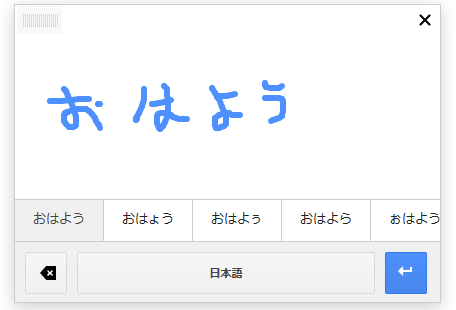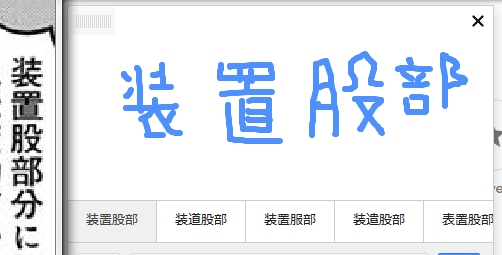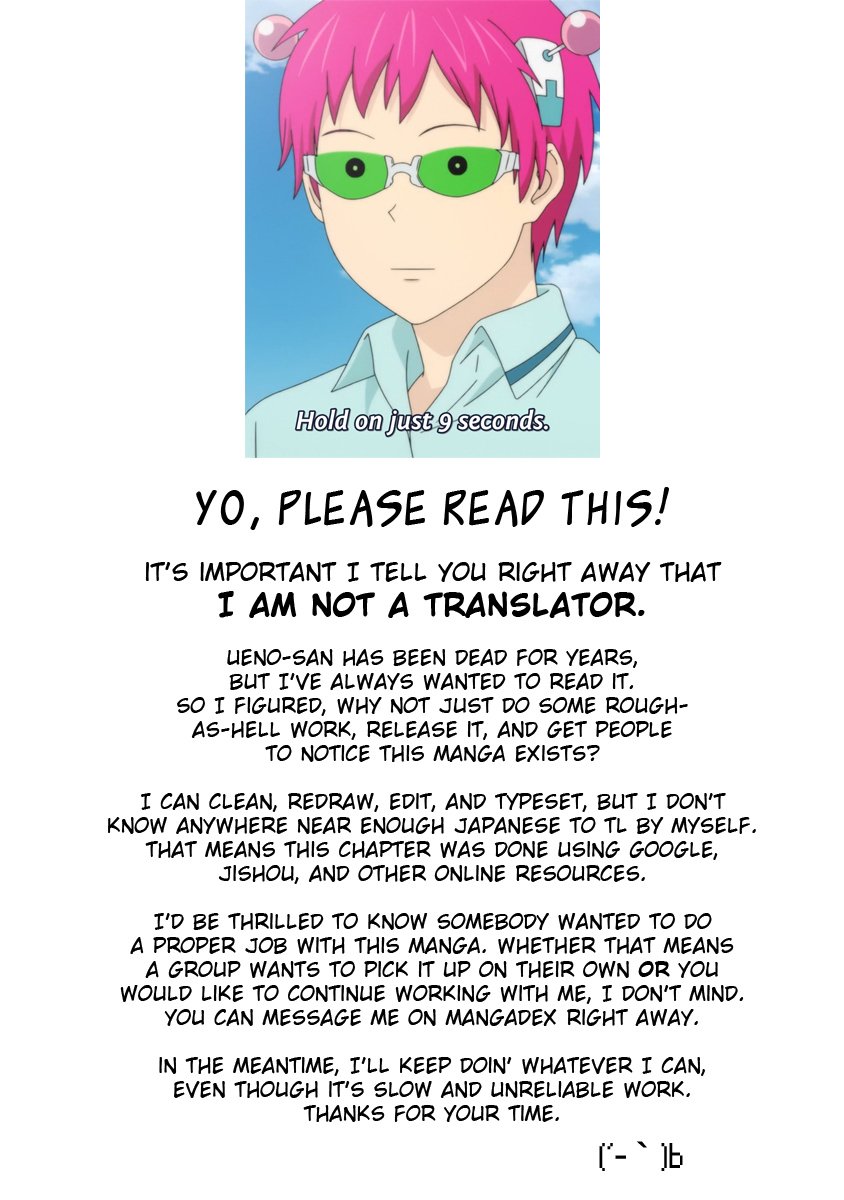@mud I like this thread! Hopefully I can offer some helpful advice, because It may surprise you to know I was actually in the exact same boat as you around this time last year, and now I have over a hundred uploads on this site (although a lot of them are one-page "chapters" shhhhh). Regardless, I totally understand the desire to work on your own, and I'd be thrilled to know you were able to follow through from any of the tips in this thread. Don't give up!
I'm going to write a bunch of advice starting from "I don't know any JP at all," so if you like, know hiragana and katakana already? Feel free to skip over that. I decided to include the full explanation in case anyone else stumbles across this thread and has less experience or knowledge than you, but also wants to try their hand at translation. Sorry in advance for the wall of text!
First, I would say that you must be able to read hiragana and katakana. Even though I didn't "know any Japanese" when I started, I did at least know all hiragana and a good percentage of katakana on sight simply because I'd begun studying them in 2017 (before I knew I wanted to work on scanlation). It takes some time and commitment to learn, but once you do know most of your kana it'll feel easy, just like knowing your A-B-Cs. I didn't use any study methods like flash cards or games to learn them, I just exposed myself to them daily. The method that worked for me is as follows:
1. I recommend following a bunch of JP users on something like Twitter. I got my start mass-following Kemono Friends fanartists after watching the show. A good portion of tweets are written without kanji (although not all of them), so this will be where you can expose yourself to kana over and over again. Also, if you follow artists, there might be text in the drawings or comics they post that you may also want to translate. Engaging with kana in this context ("I really wanna know what this says!") makes it feel immediately fun and worthwhile to learn. You could follow anyone, though: artists, official anime twitters, store twitters, manga artists, voice actors, musicians, whoever.
2. Google translate has a handwriting input feature (image sample below). You don't need to have an input tablet; you can use your mouse and it works exactly the same. Anytime you see a tweet where you want to understand what's being said, pull open a GTrans tab and get scribbling. Your stroke order doesn't need to be correct, it has really good recognition based on general shape (although stroke order is more important once you get to kanji). Writing hiragana and katakana one by one will build stronger associations with how each one is read.
3. After you've been laboriously decoding tweets or comics for a while, you should be trying to test your recognition of kana before you even go to write them in. Maybe you'll memorize the 5 vowels first, or maybe you'll pick up certain ones you have strong associations with; my first memorized hiragana were なのです (na no de su) because the owls from KF end their sentences with it, lol. You'll want a reference of some kind you can fall back on whenever your memory fails (I just have the Wikipedia pages for both sets of kana bookmarked), but over time, you should be able to grow a familiarity with more and more of them. Some of them can be visually tricky when you're starting out, like differentiating な and は, or さ, ち, and き, but anything you can do to make associations will help in the long run ("My favorite character from Zombieland Saga is Saki, and her name would be written さき - not with ち!").
That should more or less cover the basics. Obviously your results may vary, but I thought it was a pretty fun way to learn kana and keep it fresh in my mind. Translating is a bit more complicated than just having Google spit some text at you, though, so next up is covering kanji. Kanji is the reason Japanese takes years upon years to learn, and it's way more intimidating than kana. I mean, you take one look at a word like 憂鬱 and think, "How the hell can that mess mean anything?" But it does, and you want to know, so there's no use fighting it. I'll be first to admit I don't even know
too many kanji myself, but there's still ways you can work around this inexperience.
For starters, the handwriting function works the same with kanji, although very complex kanji can be a pain to get Google to figure out. Inputting them one at a time is usually best (although second image sample below shows many at once just to show it works that way, too). You don't really learn kanji this way, but it's how I look up vocabulary that's unfamiliar to me, either by relying on Google's results or copy+pasting the text into a dictionary.
The other main reason kanji is difficult is because compounds can mean more specific things than individual kanji, and a string of text with 4 or 5 kanji in a row might actually be one, two, or three compound words! This is where jisho.org comes in (or any other JP dictionary, although I use jisho myself). You can search many different ways here, and it has very good compound recognition. You can even input a kanji and search for words that begin or end with that kanji. Jisho is how I gradually turn a speech bubble loaded with more kanji than kana into a series of words and ideas. Context, if you have it, should always be how you end up deciding whether or not something makes sense.
If you'd like a more structured kanji study method, I began using WaniKani earlier this year. Full disclosure - WaniKani does eventually cost money (I haven't subscribed yet, myself) but you can cover a good amount of basic lessons totally for free, and they never force you to pay for any of the beginner courses you've covered. WaniKani teaches radicals, then kanji, then vocabulary words, focusing separately on pronunciation and meaning and relying mostly on mnemonics for helping with memorization. It's broken down into lessons (learning new stuff) and reviews (getting tested on what you should already know). The more consistently you correctly identify something, the higher it "levels up," and over time it shows up in your reviews less and less as it approaches a state of total, on-sight recognition. That's the objective, at least. I made a lot of progress using WaniKani, especially because I didn't have to come up with the pace or order of lessons for myself. I'm hoping I can afford to subscribe soon. I want to keep going.
Lastly, translation does actually require a pretty robust understanding of the output language itself. At the end of the process, you're basically just... writing, so having some confidence in your writing ability is important. Literal, bare-bones translations don't leave the best impression on people, so its important to know when to punch something up or use an equivalent word or phrase. There's about 100 million different ways I could try to offer examples of what I'm getting at, but then this post would be longer than it already is. You get better at this with practice, though.
I think I've covered everything from my experiences so far (besides my process for actually working on scanlation). I started out without "really knowing Japanese," but over time I find myself growing more familiar with common phrases, kanji, and sentences the more often I work on chapters. And by being honest with the audience about my uncertainty and picking a manga no one else was going to work on anyway, the expectations were low enough that I wasn't afraid of disappointing anyone, lol. Just come clean with a statement like below, and see what happens. If you have fun doing it, then it can't hurt to try, right?


